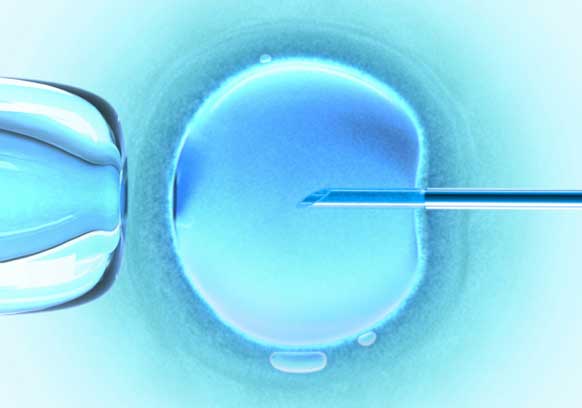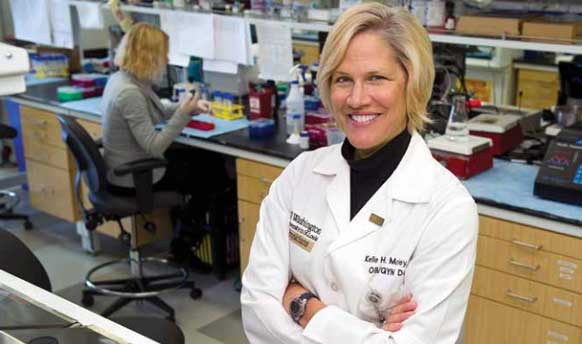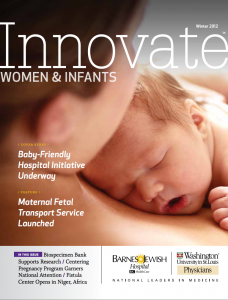
Samples from the Women and Infants Health Specimen Consortium led to a discovery by Washington University MD/PhD student Antonina I. Frovola and colleagues that could help increase successful in vitro fertilization outcomes.
As described in the Lotus Blossom Consulting blog, Frovola studied the effects of women’s essential fatty acid levels on IVF success:
The study investigated the relationship between serum levels of polyunsaturated fatty acids (PUFAs) and embryo implantation success in women that were receiving IVF. Fasting serum levels were taken from 200 women in the Women and Infants Health Specimen Consortium. Levels measured included linoleic acid (LA), alpha-linoleic acid (ALA), eicosapentaenoic acid (EPA), arachidonic acid (AA), and docosahexaenoic acid (DHA). Women were then divided into two groups: those that conceived and those that did not.
The results point to a clear link between fatty acid levels and IVF outcomes:
Although researchers did not find any associations between single PUFA levels and successful pregnancy, they did find a significant difference in pregnancy rates among women that had higher levels of specific PUFA combinations.
Noting that clinical trials will be necessary to develop specific PUFA recommendations that physicians can use to counsel women receiving IVF, Frivola explains:
“Our findings are significant, as they suggest dietary intake of specific PUFAs may be altered to benefit women undergoing IVF. Specifically, the study suggests that omega-3 and omega-6 PUFAs may have opposing effects in the endometrium, similar to other tissues.”
Read more about the study on the Lotus Blossom Consulting blog.
Improving Pregnancy-Related Health Outcomes

The Women and Infants Health Specimen Consortium is funded in part by the Children’s Discovery Institute, a world-class research partnership between St. Louis Children’s Hospital and Washington University School of Medicine that funds the work of scientists and clinicians investigating some of the most devastating childhood diseases and disorders.
In spring 2013 the institute profiled WIHSC in its Pathways newsletter:
Three years ago, the Children’s Discovery Institute launched a one-of-a-kind initiative called the Women and Infants’ Health Specimen Consortium (WIHSC). Its aim is to track long-term, pregnancy-related health outcomes of women and their infants by collecting, processing and storing clinical samples taken from women before and during pregnancy, as well as samples from infants after delivery.
The article quotes WIHSC cofounder Dr. Kelle Moley explaining a defining characteristic that has made WIHSC distinct from the beginning:
“The WIHSC is the only large tissue and biomedical information database in the United States that collects samples from women at different time points—during conception, throughout pregnancy and beyond…. This consortium enables studies that probably weren’t possible before because we didn’t have access to these samples.”
Noting that funding agencies including the National Institutes of Health don’t support infrastructure projects, Dr. Moley further pointed out that the Children’s Discovery Institute grant is essential to the research that the consortium makes possible:
“Gestation is such an important period in a child’s development, yet it is often difficult to study across a nine-month period. We hope this consortium will provide the tissue and material needed to answer the most important questions in obstetrics, gynecology and early pediatric health.”
Read the full article in Pathways.
Biospecimen Bank Provides Infrastructure for Research
 Innovate Women & Infants, a quarterly publication of Barnes-Jewish Hospital and Washington University School of Medicine, profiled the Women and Infants Health Specimen Consortium in the Winter 2012 issue.
Innovate Women & Infants, a quarterly publication of Barnes-Jewish Hospital and Washington University School of Medicine, profiled the Women and Infants Health Specimen Consortium in the Winter 2012 issue.
Of the consortium’s founding by Drs. Kelle Moley, MD, Ann Gronowski, Phd, and Marwan Shinawi, MD, the article explains:
From the beginning, Gronowski and Moley were committed to establishing a large bank of specimens collected from all stages of pregnancy. In fact, the two women’s complementary skill sets played a significant role in the foundation of WIHSC and its ongoing success. Thanks to her practice in obstetrics and gynecology, Moley had connections to physicians in those fields and understood what was needed to achieve patient enrollment. Gronowski’s research in the field of pathology gave her particular insight into the collection and storage of specimens.
The article further points out that WIHSC principal investigators have served as facilitators for much of the research that makes use of WIHSC samples, assisting with study design and also providing access to samples that most researchers would not otherwise have.
WIHSC is unusual in its ability to offer researchers access to its biospecimen bank without requiring specimen deposits to replace ones that are retrieved. Because it collects and processes new samples daily, the repository’s reserves are never depleted.
Even as early as 2012, the article notes that WIHSC had made a significant impact on the breadth and quality of research in pregnancy and other women and infants health topics:
Since its inception, WIHSC has significantly changed the landscape of translational research in women and infant health at Washington University, providing resources to the departments of pathology, pediatrics, and obstetrics and gynecology, and supporting research in areas not historically connected with reproduction, including the departments of anesthesiology, social work, molecular microbiology, developmental biology and internal medicine, and the Washington University Brown School of Social Work. The consortium has supported research in a wide variety of women’s health issues, including infertility, pre-eclampsia, recurrent pregnancy loss and preterm delivery, as well as gynecologic pathologies such as endometriosis and sexually transmitted infections.
Read the full article online (see pages 6 and 7).
